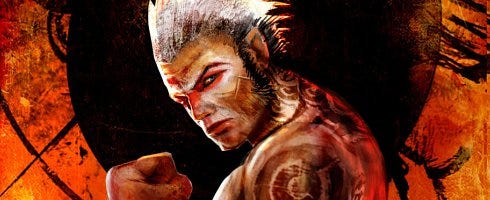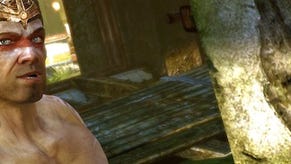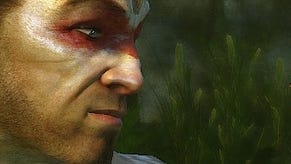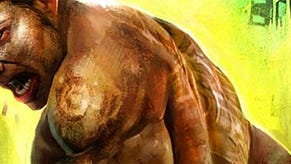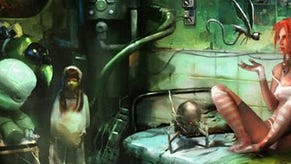Interview - Enslaved's Tameem Antoniades
When Namco announced Ninja Theory's Enslaved: Odyssey to the West in September 2009, folks were surprised to learn the tactical action-adventure game with its post-apocalyptic setting was based upon the ancient Chinese novel Journey to the West, and the subsequent 80s television series.
Centered on the complex relationship between main characters Monkey and Trip, players use a mix of combat, strategy and environmental mechanics in order to get back to Trip's home village. Along the way, the duo must fight robots hell-bent on eradicating humans, the pair relying each on another and their strained relationship to survive.
The game features actor and director Andy “Gollum” Serkis as Monkey, along with music composed by Nitin Sawhney. Novelist Alex Garland (28 Days Later) having penned the script.
Lucky for us, Ninja Theory boss Tameem Antoniades was willing to speak with us again regarding the game at Develop yesterday, and gave more information on the planned demo, DLC, and tell us exactly what he thinks of 3D and motion controls.
Join us for more after the break.
Interview by Joe Anderson.
VG247: How do you feel about the current generation of consoles? Do feel that people are starting to get bored with sequels and first-person shooters?
Tamdeem Antoniades: I don't think it's the consoles' fault if people get bored. I think the more we can stay with this generation the better the games will become. New consoles can be disruptive; you have a whole new console to learn and you tend to play it safe on the creative aspects. A game like Red dead Redemption showed that a large evolutionary jump is possible, so I'm hoping we have a few more years.
Microsoft and Sony are obviously trying to extend its current generation of consoles with technology such as Kinect and Move. How do you feel about these devices? Do you think they're more designed for the casual, or do you think they can offer something to the core as well?
Tamdeem Antoniades: To be honest, I haven't tried them out, so I don't know how it feels. I'd actually need to try them so I could get a feel for them and see what they can do. The problem is that they're peripherals, so you always have to treat them as if they were optional - at least for the kind of big budget games we do.
We have to make sure that it still works without them. So, it's kind of not ideal if the whole console isn't based around it from the get-go; that would probably change things dramatically.
Given that your games aren't geared towards the casual audience, do you feel these devices will benefit developers such as yourself?
Tamdeem Antoniades: I don't know. Like I said, I probably ought to try them out, but I'm not jumping at the tech. I'm not, because I feel they have to be optional.
When do you think you'll be releasing a demo for Enslaved?
Tamdeem Antoniades: It's not been announced, but we are doing a demo. Since it's a new IP, it doesn't have a pedigree; I'm keen for people to actually get a hands on.
I understand you are working on DLC for the game. Since it's story-based, will it be more of a side adventure then?
Tamdeem Antoniades: Yes, it will be a side-adventure. We want to be very clear that the story has a beginning, middle and end, so you don't need to get the DLC to fill in the gaps. It's a totally separate side-story, and totally separate from the main production of the game.
If the DLC proves to be successful, do you plan on providing more?
Tamdeem Antoniades: Yeah, that would be good. We don't have a plan as such yet, but if it does work - I don't know much about the dynamics of the DLC business - but if it does work I will be keen to do more.
Is there a difference between the two console versions of the game? Will one have any exclusive content over the other, or will they both be the same?
Tamdeem Antoniades: Our goal is to make them both identical.
Providing the game is successful, are you planning any sequels at all?
Tamdeem Antoniades: No, one of the things Alex [Garland] told me, and I agree, was: 'Don't hold anything back. Work on every project as if it were your last'. So, we've worked on two games now that haven't generated a sequel - Kung Fu Chaos and Heavenly Sword - and our base position is there probably won't be a sequel. But we desperately hope that there will be [laughs].
I understand that you're working on a secret project. Can you tell us anything about that?
Tamdeem Antoniades: Nothing at all, sorry.
How much drama and progression did Alex [Garland] bring to the game? Do you feel that by bringing him in the game's completely changed from what your idea was originally?
Tamdeem Antoniades: No. The mechanics and the gameplay were always there since fairly early. What has changed is the feel of the game. There's more of an emotional feel now, and you've got moments of tension. You don't know why you're feeling tense; it's just cues. You've got the lights, the music, the sound, the body language. Just small things change as you play.
So, while the mechanics are the same, everything else is lifted. At least that's what we tried to do. Make sure that the mood, the pacing and the story beats all happen in gameplay as well as in cut-scenes.
So, it's just like a movie, where the atmosphere and the music build the tension up.
Tamdeem Antoniades: Yeah, yeah.
Do you think games will eventually get to the point where it feels like the we're actually playing a movie?
Tamdeem Antoniades: Yeah. I think with the kind of game we're doing, yeah. But not for all games. Not all games are story-driven, and not all games are particularly trying to create the type of experience we are. But the technology we use, like the motion-capture technology, is the same technology they used on Steven Spielberg's Tin Tin.
When we were shooting Monkey, James Cameron was on another stage shooting Avatar, Spielberg was in another location shooting Tin Tin, and Uncharted was on another stage. We'd kind of visit each others sets so we'd get a chance to see... Well, I didn't get to see Avatar, but I got a chance to see how Spielberg was shooting and his producer came over and had a look at ours. Robert Zemeckis also had a studio there. I didn't have a chance to see that, but it's interesting how the same crew, the same talent are all kind of looking at each other and moving in between projects. It was quite cool.
Would you ever consider making a PC MMO, or even an RPG?
Tamdeem Antoniades: I'd say never say never, and I haven't thought about it too much to be honest. But never say never [laughs].
What about 3D? Where do you stand on that?
Tamdeem Antoniades: I think 3D's cool. I think it's actually going to be the future of gaming. I think there's still some technical hurdles to get over. There's some people who suffer from motion-sickness, and the tech is not quite there because the higher the frame-rates, the higher the resolution that we can achieve per eye - the less we'll have those problems. So I think 3D is not 100 percent there yet.
Is retrofitting your games with 3D something you would consider down the line if the tech became mainstream enough?
Tamdeem Antoniades: I don't know. Games are quite disposable. They come out, and then after a few weeks they're kind of off the shelves and then they just kind of circulate and stuff. So I don't know if we would retrofit, or if that would even be possible.
Enslaved: Odyssey to the West releases for PS3 and Xbox 360 on October 5 and 8 in the US and Europe respectively.
